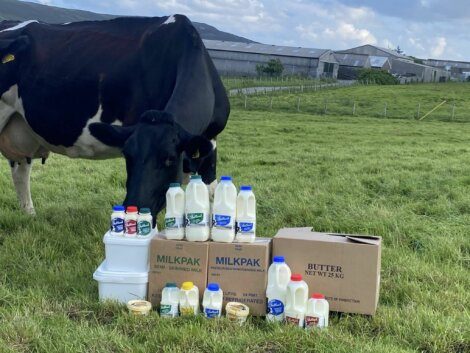Agriculture / Dairy concern as costs continue to rise
PRODUCTION in Shetland’s dairy industry is being restructured amid rising costs and recruitment challenges.
Shetland Farm Dairies director John Irvine, who runs the dairy farm in Tingwall, said work at the Lerwick processing plant has been reduced from six days a week to five.
He said there have also been struggles with recruiting people into jobs at the company.
“It’s come to the point now where you canna get staff in to do six days,” the farmer said.
“What we’re trying to do is restructure to a five day week. Hopefully that will reduce operating costs.”
It comes as the competition from milk from the mainland sold in Shetland supermarkets continues to intensify.
Those behind Shetland Farm Dairies spoke out this week after supplies of non-local goods at Tesco were affected when the NorthLink freight vessel Helliar went into unscheduled drydock.
Irvine said Tesco in particular sells milk from outwith Shetland at “cut price” – “they are more or less giving it away”.
“You can’t compete with south,” he added.
Irvine also claimed the supermarket has a certain amount of milk coming in per week, “and if they’re not selling enough, they phone us and cancel – we’re like a buffer”.
This is what is behind suggestion from the dairy that locally produced milk is sometimes having to be poured away.
It is fair to say the dairy industry in Shetland is a much different picture than it was in the past.
Back in the early 1990s more than ten local farmers took over the running of the dairy in Shetland.
But now only two dairy farms remain, at Setter in Tingwall and in Quendale.
Milk is taken from cows on the dairy farms before it is transported for processing at Shetland Farm Dairies’ plant in Lerwick. The company produces milk, butter, cream and buttermilk.
Become a member of Shetland News
At the moment there are 18 full-time and four part-time jobs between the two farms and the processing plant.
Irvine said one key issue at the moment is new rules and regulations which are due to come into force in Scotland in the coming years regarding spreading and storage of slurry.
“It’ll cost a lot of money, well into six figures, to comply with the regulations,” Irvine said.
Meanwhile cost increases have been experienced in areas such as bottling, freight, wages and energy.
Irvine added that during lockdown there was a big increase in sales through local shops, and less in the supermarkets.
“But once the lockdown cleared then it went back to where it was,” he said.
Become a member of Shetland News
Shetland News is asking its many readers to consider paying for membership to get additional features and services: -
- Remove non-local ads;
- Bookmark posts to read later;
- Exclusive curated weekly newsletter;
- Hide membership messages;
- Comments open for discussion.
If you appreciate what we do and feel strongly about impartial local journalism, then please become a member of Shetland News by either making a single payment, or setting up a monthly, quarterly or yearly subscription.















































































